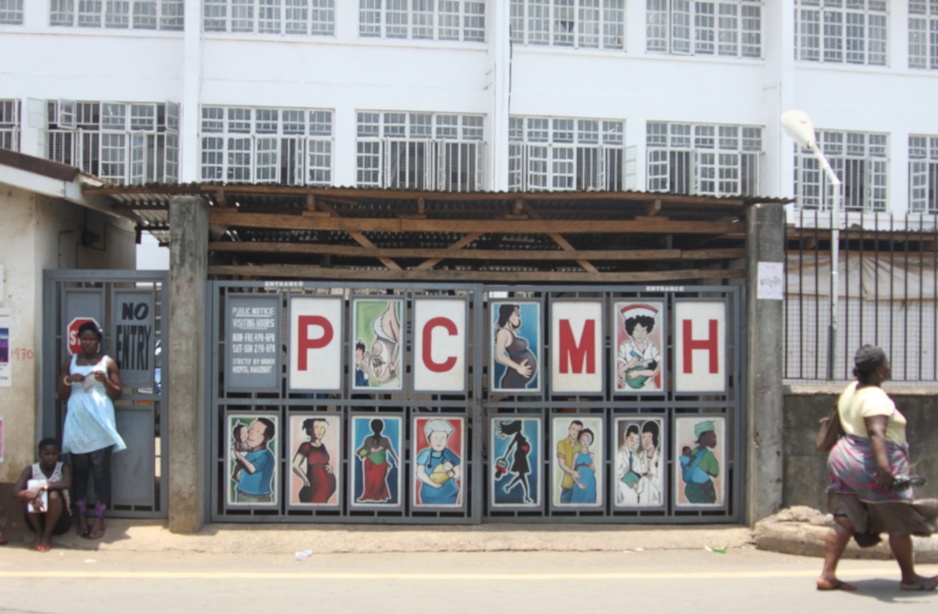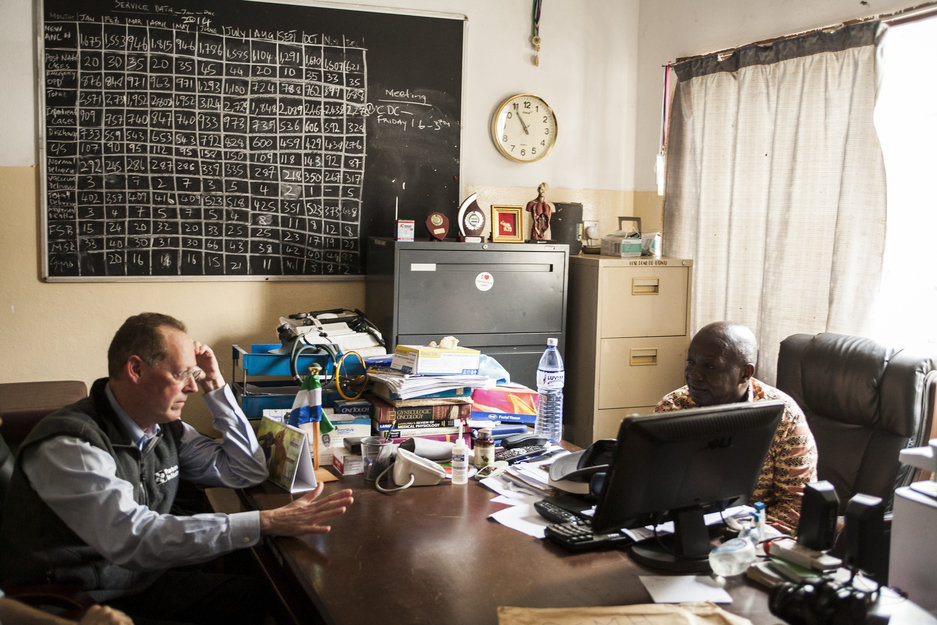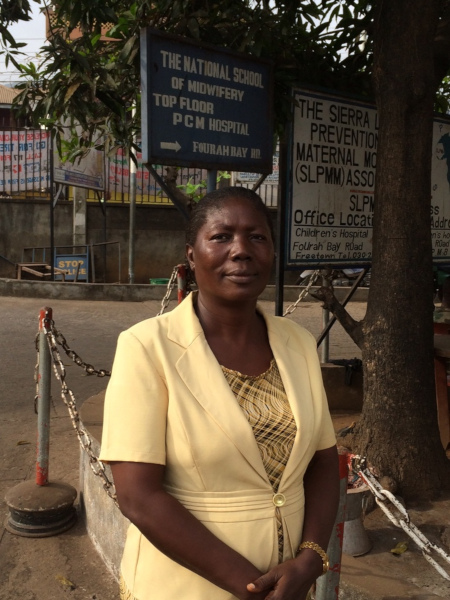Research: Maternal Care Methods Can Save Lives, Reduce Infection Amid Ebola


Lessons from an innovative Ebola screening and isolation unit for pregnant women, created five years ago in West Africa, could inform maternity care and save lives during the current outbreak in the Democratic Republic of Congo (DRC), a new study shows.
A Partners In Health team opened the groundbreaking isolation unit in November 2014 at Princess Christian Maternity Hospital in Freetown, Sierra Leone, in collaboration with the country’s Ministry of Health and Sanitation. The need for the unit was dire: Pregnancy-related complications frequently can mirror Ebola symptoms, creating huge challenges for maternal care in what was already one of the most dangerous countries in the world to be pregnant.
In Sierra Leone, one in 17 women dies because of complications from pregnancy or childbirth. Sierra Leone sees more than 1,300 maternal deaths for every 100,000 live births and has fewer than 10 nurses or midwives for every 10,000 people—compared to the roughly 100 nurses or midwives available for every 10,000 people in Canada.
Those conditions were exacerbated by the deadliest Ebola epidemic to date, which would claim more than 11,000 lives across several countries—including nearly 4,000 in Sierra Leone—before ending in 2016.
“The symptoms of pregnancy look so similar to Ebola,” says Ahmidu Barrie, operations director for PIH in Sierra Leone and former director of the Wellbody Alliance, with which PIH partnered during the 2014-16 epidemic. “One of PIH’s first interventions at Princess Christian Maternity Hospital was training staff on infectious prevention control measures and how to spot Ebola symptoms in patients.”
Working to improve maternal care, reduce pregnant women’s risks of Ebola infection and death, and create better, safer conditions for pregnant women in Ebola screening units were vital parts of PIH’s response.
PIH midwife Diana Garde, clinical lead for the isolation unit, and Drs. Rebecca Kahn, Annelies Mesmen, Alimamy Philip Koroma, and Regan Marsh, now director of clinical systems for PIH, published lessons they learned from that response in July’s Journal of Midwifery & Women’s Health. Their paper, “Care of Pregnant Women: Experience from a Maternity-Specific Ebola Isolation Unit in Sierra Leone,” includes recommendations that the team says could be invaluable during current and future Ebola outbreaks.
“We recommend implementation of basic emergency obstetric and neonatal care interventions in isolation facilities…while ensuring the highest attention to infection, prevention, and control, and health care worker safety,” the paper states. “Supervised birth reduces maternal mortality through the ability of the attendant to manage hemorrhage, eclampsia, infection, and other pregnancy complications. Providing emergency obstetric and neonatal care adapted to the isolation context was possible and likely lifesaving.”

Lifesaving lessons
Specifically, Garde hopes their research will help medical teams fighting the ongoing Ebola epidemic in the DRC, where more than 2,200 people have died across three provinces since the summer of 2018.
“We want to encourage those (treating pregnant women) in the DRC to offer a higher level of obstetric care while still addressing the spread of infection, and improving data collection, on-site, timely access to laboratory facilities, and other elements of care,” she says.
The urgency to reduce Sierra Leone’s maternal mortality rate became even more drastic in early 2014, when Ebola spread across the Guinea border and many development agencies delivering care fled the country.
Garde, though, was arriving at that time. She began her work with PIH on a six-week stint at Princess Christian Maternity Hospital, and quickly became part of the Ebola response. While she also worked at a maternity unit in a remote, impoverished region of Sierra Leone called Kono District, she soon was fully assigned to Princess Christian and Freetown because of continuing Ebola cases.
“We created isolation and management plans for maternity at the hospital,” Garde says. “As caregivers, women were disproportionately affected by the epidemic.”
Conditions were challenging to begin with. Before Ebola struck, many women in Sierra Leone were delivering at home, because they couldn’t pay for care or didn’t fully trust a medical system that was gutted by a lack of resources, staffing, and even electricity at hospitals and clinics, following the country’s civil war. Home deliveries accounted for more than 50 percent of childbirths in Sierra Leone before Ebola, and the percentage worsened during the epidemic.
Travel restrictions further hurt women’s ability to reach hospitals, and risks didn’t end when they arrived. Before PIH helped Princess Christian improve its Ebola screening and isolation, expectant mothers unknowingly infected with the virus could be placed in the maternity ward among healthy women.
At that time, there wasn’t a system in place to screen mothers, so Garde and other health workers at Princess Christian began refining staffing and treatment models, clinics, and even other community centers, to help those facilities safely and accurately screen pregnant women for the virus.
In November 2014, the PIH team implemented what, to their knowledge, was the world’s first maternity-specific screening and isolation system.

Better maternal care
Garde’s six-week stint turned into 18 months, as the team established a novel model of screening, isolation, and care for maternity patients that effectively reduced women’s risk of infection and mortality during the outbreak, and was developed in collaboration with other international groups and experts.
The maternity unit’s 11 beds were rarely empty during that time. Many women brought to the clinic by family members were treated for preeclampsia, a serious pregnancy complication in which high blood pressure leads to seizures.
“We’d deliver and look after the baby, not knowing if the mother was going to make it,” Garde says. “But with great effort and teamwork, it was incredible to look into the unit, two days after delivery, and see the mom sitting up in bed eating.”
For nearly two years, working with hospital leadership and Sierra Leone’s Ministry of Health and Sanitation, PIH supported Princess Christian Maternity Hospital in strengthening the health care system to improve safety and health outcomes, addressing the unique needs of pregnant women during the epidemic. They worked tirelessly, adapted screening guidelines to include maternal health care issues, built a new screening area, lowered turnaround times for lab results, and improved the isolation unit to enhance safety and care delivery.
Additionally, they trained and hired additional staff for infection prevention and control, so the hospital could continue to provide care for pregnant women during outbreaks. Training in emergency obstetrics also was a focus, as many of the women who arrived at the hospital already were in serious conditions.
PIH teams also performed general maternity and psychosocial care, not only to help run the isolation unit, but also to establish a higher long-term standard of health care in Sierra Leone.
“When the outbreak was declared over we started to work on preparedness planning, so the hospital would be ready for future outbreaks of infectious disease,” Garde says.
Lasting model
Barrie said that work has continued.
“The model of care PIH implemented at Princess Christian was important for teaching clinical staff the skills needed to protect women during that time. It also went a long way in starting to build trust with women that a clinical facility is somewhere they can receive proper care,” he says. “The infection prevention control techniques PIH established are still in motion at Princess Christian’s delivery center. Those learnings are still benefitting patients today. The government staff in Sierra Leone rotate around different hospitals as part of their job, so the learns at Princess Christian are also being shaped at other facilities around the country.”
By 2016, when the outbreak began to subside, one of every 10 Ebola survivors in Sierra Leone had been a PIH patient. Today, PIH continues work to lower Sierra Leone’s maternal mortality rate, with ongoing projects and improvements in collaboration with the Ministry of Health and Sanitation.
“If a patient needs an emergency delivery, we can put them on an ambulance, which wasn’t previously available, and they are treated by an obstetrics specialist,” says Marta Lado, an infectious disease specialist and chief medical officer for Partners In Health in Sierra Leone. “We have services mothers need for all types of deliveries.”
Article originally posted on pih.org



